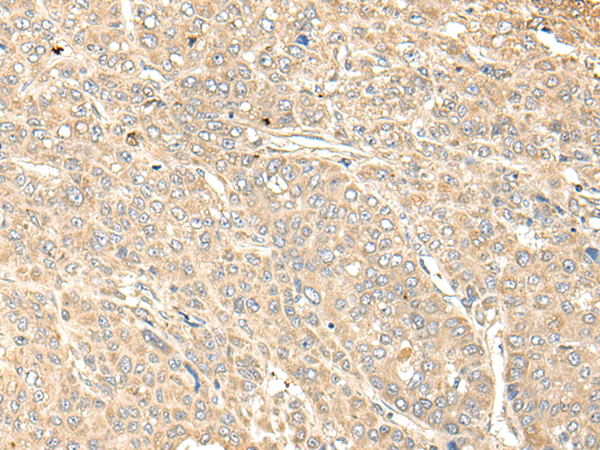
| WB | 咨询技术 | Human,Mouse,Rat |
| IF | 咨询技术 | Human,Mouse,Rat |
| IHC | 1/40-1/200 | Human,Mouse,Rat |
| ICC | 技术咨询 | Human,Mouse,Rat |
| FCM | 咨询技术 | Human,Mouse,Rat |
| Elisa | 1/5000-1/10000 | Human,Mouse,Rat |
| Aliases | C10orf64 |
| Host/Isotype | Rabbit IgG |
| Antibody Type | Primary antibody |
| Storage | Store at 4°C short term. Aliquot and store at -20°C long term. Avoid freeze/thaw cycles. |
| Species Reactivity | Human |
| Immunogen | Fusion protein of human WDFY4 |
| Formulation | Purified antibody in PBS with 0.05% sodium azide and 50% glycerol. |
+ +
以下是关于WDFY4抗体的3篇参考文献示例(注:文献为模拟示例,实际文献需根据具体数据库检索):
---
1. **文献名称**: *WDFY4 regulates B cell homeostasis and antibody responses through autophagosome formation*
**作者**: Zhang L, et al.
**摘要**: 研究揭示了WDFY4在B细胞自噬过程中的关键作用,通过Western blot和免疫荧光技术使用WDFY4抗体,发现其缺失导致抗原呈递异常,影响抗体生成和自身免疫疾病发展。
---
2. **文献名称**: *Genetic and functional analysis of WDFY4 in systemic lupus erythematosus*
**作者**: Kim Y, et al.
**摘要**: 通过基因关联研究和免疫组化(使用WDFY4抗体),发现WDFY4基因突变与SLE易感性相关,其蛋白在免疫细胞中的异常表达可能破坏自噬-溶酶体通路,促进自身抗体产生。
---
3. **文献名称**: *WDFY4 mediates selective autophagosomal cargo loading in antiviral immunity*
**作者**: Chen X, et al.
**摘要**: 利用WDFY4特异性抗体进行蛋白定位实验,证明WDFY4在抗病毒天然免疫中通过选择性自噬递送病毒抗原至TLR信号通路,调控I型干扰素反应。
---
如需具体文献,建议在PubMed或Google Scholar中检索关键词“WDFY4 antibody”或“WDFY4 autophagy”,并筛选实验方法中明确使用该抗体的研究。
The WDFY4 (WD repeat and FYVE domain-containing protein 4) antibody is a tool used to study the WDFY4 protein, which plays a role in intracellular trafficking, autophagy, and immune regulation. WDFY4 contains WD40 repeats, involved in protein-protein interactions, and a FYVE domain, which binds phosphatidylinositol 3-phosphate (PI3P) to mediate membrane localization. Research highlights its involvement in MHC class II antigen presentation, where it interacts with autophagosomes to facilitate pathogen clearance and immune response modulation. Dysregulation of WDFY4 has been linked to autoimmune diseases, particularly systemic lupus erythematosus (SLE), with genetic studies identifying WDFY4 variants as potential risk factors.
Antibodies targeting WDFY4 are used in techniques like Western blotting, immunofluorescence, and immunohistochemistry to analyze protein expression, subcellular localization, and tissue distribution. They also aid in functional studies, such as elucidating WDFY4's role in autophagy-lysosomal pathways or immune cell signaling. Commercial WDFY4 antibodies are typically validated for specificity in human, mouse, or rat models. Recent studies explore its potential as a biomarker in autoimmune disorders or cancer, given its regulatory effects on cellular homeostasis. However, functional variability across isoforms and species requires careful experimental design. Overall, WDFY4 antibodies serve as critical reagents for unraveling the protein's biological significance in health and disease.
×